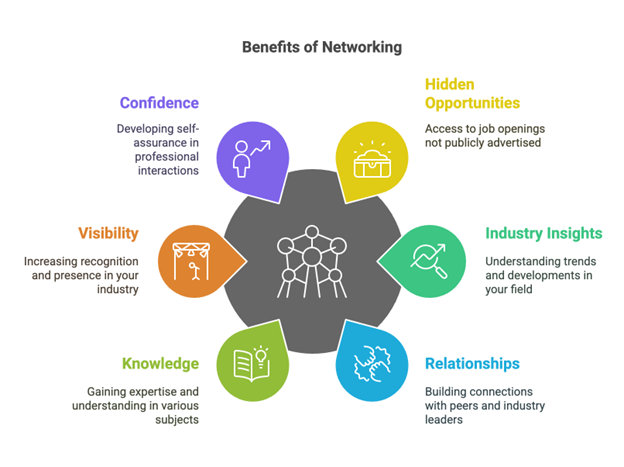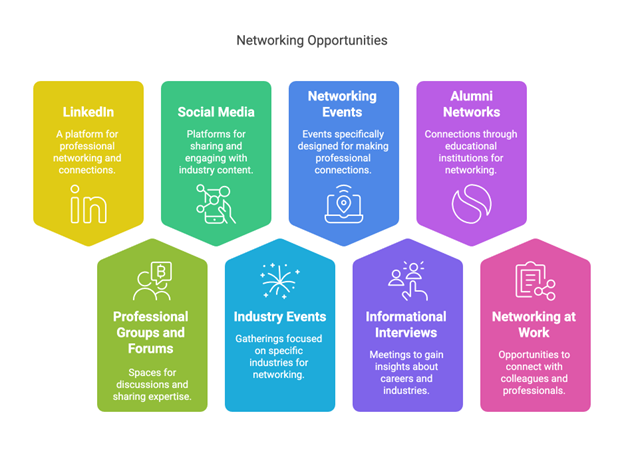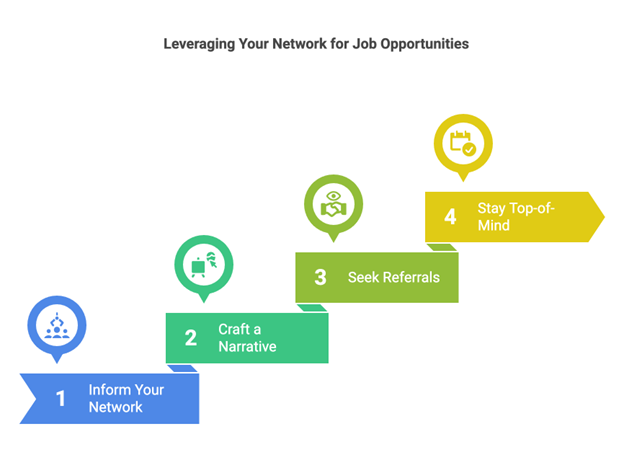Career Networking Tips: How to Network For Jobs
Relying on the same old job search tactics aren't enough in today's market anymore.

Tips on How to Network for a Job in Singapore
In today's competitive job market, just firing off online applications and crossing your fingers often isn't enough. The old way of only using resumes and cover letters is becoming less and less effective. Employers are now looking for candidates who not only have the right experience but also show they're proactive, have great communication skills, and are genuinely keen on their company.
What is Networking
Networking, in its broadest sense, is all about connecting with people who might be able to help you out with your career. This could be people in your own line of work, but also people in related fields or even completely different industries. Networking can happen in lots of ways, from chatting casually at industry events to having more formal chats called informational interviews.
What is Career Networking
Career networking is a bit more specific. It's about actively building and looking for professional relationships to help you move forward in your career. This means actively trying to meet and connect with people who can give you advice, insights, and maybe even opportunities in the area you want to work in. It's about creating relationships that benefit everyone involved and setting yourself up for success down the line.
The Benefits of Networking: More Than Just Finding a Job
While networking may help you get a job, it's way more than that! Building a solid professional network can give you a ton of advantages throughout your career, like:

Access to Hidden Opportunities
Networking is a great way to find job openings that aren't even advertised. A lot of roles get filled through word-of-mouth or when someone inside the company recommends someone, before they're ever posted on job boards or by recruitment agencies. This "hidden job market" is where your connections come in, giving you a real edge over people who only use traditional job search methods.
Gaining Industry Insights
Networking lets you get the inside scoop on different industries, companies, and jobs. By talking to people who've been there and done that, you can learn firsthand about what's happening in the industry, what the company culture is like, and where different career paths might lead. This helps you make smarter choices about your career and find opportunities that are a good fit for your skills and interests.
Building Relationships
One of the best things about networking is that you get to build real relationships with people in your field. These relationships can give you ongoing support, mentorship, and chances to work together throughout your career. A strong network can offer guidance, advice, and a boost when you're facing challenges, and it can also open doors to new things you might not have found on your own.
Expanding Your Knowledge
Networking can introduce you to fresh ideas, different ways of seeing things, and the latest trends in your industry, which keeps you learning and growing professionally. Chatting with people from all sorts of backgrounds and with different experiences can broaden your understanding of your field and help you stay ahead of the game. This knowledge is super valuable for improving your skills and making smart decisions about your career path.
Increased Visibility and Credibility
Connecting with influential people in your industry can really boost your visibility and credibility. When you're associated with respected professionals, some of their good reputation can reflect on you, raising your profile in your field. Getting to know key people can also lead to endorsements, recommendations, and chances to collaborate, which further strengthens your credibility and expertise.
Developing Confidence and Communication Skills
Networking gives you fantastic opportunities to practice and get better at talking to people and building relationships. Having conversations, asking thoughtful questions, and really listening to what others have to say can make you much more confident in social settings. These skills are crucial for building rapport, establishing trust, and effectively showing potential employers or collaborators what you bring to the table.
Access to Diverse Perspectives and Support
Creating a network with people from various backgrounds, experiences, and viewpoints can enrich your professional life in so many ways. A diverse network can provide a wider range of support, advice, and encouragement, especially when you're going through tough times. It can also challenge your assumptions, broaden your perspective, and help you come up with more creative and innovative solutions.
Enhanced Problem-Solving and Decision-Making
When you're dealing with tough problems or big decisions, networking can be a real lifesaver. Your connections can bring in a whole bunch of different viewpoints and ideas for solutions that you might not have thought of. By chatting things through with others, you can get fresh perspectives, weigh up your choices, and ultimately make smarter calls.
Increased Creativity and Innovation
Networking can also be a great way to get your creative juices flowing and come up with new ideas. Connecting with people outside your usual crowd can inspire you with their work, what they've achieved, and how they see things. This mix of ideas can lead to really innovative projects, ventures, and solutions that you might not have come up with on your own.
Improved Negotiation Skills
Being good at negotiating is super important for getting ahead in your career. Networking gives you the opportunity to learn from how other people handle negotiations and pick up some effective strategies. This can make you feel more confident when you're standing up for yourself, whether it's talking about your salary or agreeing on project details with clients.
Your Guide to Effective Networking in Singapore

Online Networking
Digital platforms offer easy and convenient ways to connect with professionals all over the world and in all kinds of industries. Here are some of the best online channels for networking:
- LinkedIn: LinkedIn is the place for professional networking. Create a great profile that shows off your skills and experience, connect with people in your field, join groups that are relevant to you, and join in the discussions to grow your network and get noticed.
- Professional Groups and Forums: Online groups and forums for specific industries or jobs are a fantastic place to connect with people who share your interests, exchange ideas, and learn from experts. Get involved by asking questions, sharing your expertise, and participating in conversations.
- Social Media: Even though platforms like Facebook and X are mostly for socialising, you can also use them to network and find jobs. Follow leaders in your industry, companies, and organisations you're interested in, share interesting articles and updates, and join in conversations to build your online presence and connect with potential collaborators.
Offline Networking
While online networking is easy and lets you reach a lot of people, meeting people in person often leads to stronger and more meaningful connections. To build deeper relationships and create rapport, check out these valuable offline networking options:
- Industry Events: Going to industry events like seminars or workshops is a great way to learn about the latest trends, meet other professionals in your field, and expand your knowledge. Make sure you introduce yourself to people, chat with them, and swap contact details.
- Networking Events: Networking events are specifically designed to help you make professional connections. These events usually bring together people from different backgrounds and industries, giving you a chance to grow your network and explore opportunities to work together. Prepare a short and engaging introduction to yourself and what you're looking for, and be ready to listen carefully and participate in conversations.
- Informational Interviews: Informational interviews involve contacting professionals in your field to get information and advice, not necessarily to ask for a job. These interviews can provide valuable insights into specific jobs, industries, and companies, and help you build relationships with experienced people.
- Alumni Networks: Take advantage of your alumni network by attending events for former students, connecting with other graduates on LinkedIn, or joining alumni groups. Alumni networks can offer great support, guidance, and potential job leads.
- Networking at Work: Don't forget about the networking opportunities right where you are. Connect with colleagues in other departments, go to company events, and join in team activities. Developing strong relationships with your co-workers can lead to valuable collaborations, mentoring, and even internal job openings.
It's normal to feel a bit nervous about networking face-to-face, especially if you're in a situation where you don't know anyone. But remember, every relationship starts with that first conversation. Try to step outside your comfort zone, approach new people with genuine curiosity, and focus on creating real connections. You might be surprised by how willing people are to connect and share their experiences.
Networking Etiquette
When you're networking, good etiquette is important. It's not just about swapping business cards; it's about making real connections and leaving people with a positive impression. Knowing how to network properly can be the key to building strong relationships and opening doors to great opportunities. It shows that you respect other people's time and knowledge, helps you build trust, and makes you come across as professional.
Here are some essential tips for good networking etiquette:
- Building Rapport: Try to connect with people genuinely by showing you're interested in them and what they do. Ask questions that encourage them to talk, really listen to their answers, and look for things you have in common to create a bond.
- Active Listening: Give your full attention to what others are saying, ask questions to make sure you understand, and show that you value their opinions and ideas. Active listening is vital for building trust and creating meaningful connections.
- Follow Up: After networking events or informational chats, send a quick thank-you note or email to say you appreciated their time and to remind them you're still interested in connecting. This shows you're professional and helps to strengthen the connection.
- Reciprocity: Remember, networking goes both ways. Be ready to offer your help, share what you know, and introduce people to others whenever you can. Being helpful builds strong relationships and creates a positive vibe within your network.
From Networking to Job Offers: Making the Most of Your Connections

You've put in the work to build a great network—now it's time to use those connections to boost your job hunt! Here's how to make the most of your network to find those hidden job opportunities and increase your chances of getting hired:
- Let People Know: Be open about the fact that you're looking for a job. Tell your network the types of roles and industries you're aiming for. When people know what you're after, they can keep an eye out for potential openings and connect you with the right people or companies.
- Tell Your Story: To really grab people's attention, craft a compelling "career story" that sums up your skills and what you're passionate about. Start by figuring out your biggest strengths and showing off your achievements with numbers whenever you can, making sure to organise your pointers in a clear manner. Keep it short and sweet, and highlight the key experience and skills employers look for. By clearly and concisely explaining what value you bring, you make it easier for people in your network to support you.
- Ask for Help: Don't be afraid to ask for referrals or introductions to people who could help you in your job search. Referrals are a big deal because they come with a stamp of approval from someone your contact trusts, which greatly improves your chances of getting an interview and, ultimately, landing the job.
- Stay Connected: It's important to keep in touch with your network, even when you're not actively searching for a job. Share interesting articles, give updates on your successes, or mention relevant industry news to stay on their radar. Looking after these relationships means you have a support system to rely on throughout your career.
Build Your Network, Build Your Career
Networking is a super valuable tool for growing your career and achieving success. From finding those hidden job opportunities and getting insider knowledge about your industry to sparking creativity and improving your negotiation skills, networking has a lot to offer.
While it can be hard to find a job in Singapore's competitive job market, especially when you're looking for that perfect role, having a strong professional network can give you a big advantage and help you move your career forward.
Remember to network authentically, focusing on building real connections and providing value to others. With the right networking skills and a proactive attitude, you can confidently navigate career transitions and ultimately build a rewarding and successful career.
Posted on 8/11/2025 1:40:15 PM